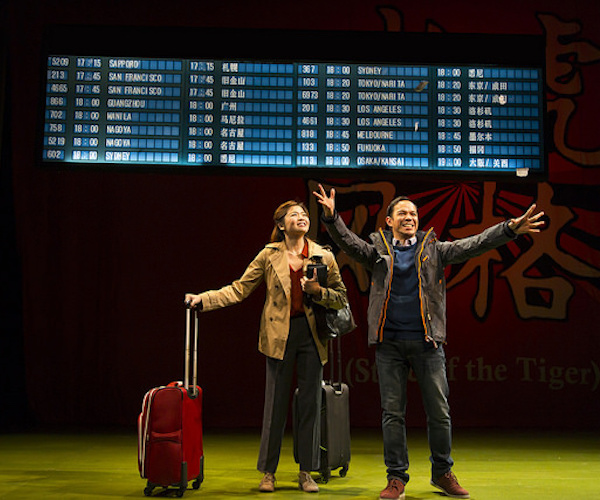Theater Review: “Tiger Style!” — Theatrical Silly Putty
Tiger Style! blows by like a whirlwind — wordy, frivolous, and ultimately unsatisfying.
Tiger Style! by Mike Lew. Directed by Moritz von Stuelpnagel. Staged by the Huntington Theatre Company, Calderwood Pavilion, 527 Tremont St., Boston, MA, through November 20.

Ruibo Qian and Jon Norman Schneider in the Huntington Theatre Company production of “Tiger Style!” Photo: T. Charles Erickson.
By Robert Israel
Midway through the first act of Tiger Style!, an occasionally funny, erratically clever, jack-in-a-box two-act play, I felt that I was trapped in a retro-cartoon world, particularly the kind of absurdist flapdoodle generated by Rocky and Bullwinkle’s “Fractured Fairy Tales.” The catch is that the anthropomorphic farceurs were a lot funnier.
You might remember that there was a potted moral at the end of each “Fractured Fairy Tale,” those absurd re-tellings of Aesop or La Fontaine. Wade through the morass of this play and there’s a Big Message at the end of Tiger Style!, too. You see it coming after awhile, after all the distractions subside. And when it finally arrives it turns out to be a neat wind-up (wrapped up in a neat conservative ribbon) to Lew’s contrived package. But before you reach the payoff, you have to endure silly comic characters jitterbugging their way through a banana-peel existence, listen to two hours of inane banter, and suffer through scene after scene of claptrap.
The sort-of story: Chinese-American brother and sister Albert (Jon Norman Schneider) and Jennifer (Ruibo Qian), live together in a cozy house (“for tax purposes,” he later tells us), in Irvine, California. He is a computer geek whose over-achieving ways have deposited him in a nowhere job as a programmer. She’s a medical doctor, same M.O., only she’s more self-satisfied. Nothing in their lives seems to be going according to the master plan (the latter being the high expectations their parents imbued them with when the kids were spoiled brats attending Harvard University). They whine and moan. They lament their ethnicity, it’s so damned burdensome. What if they become more “white” and less ethnic! Since they’ve pretty well failed in their quests to succeed as quasi-assimilationists, this strategy seems to make a lot of sense — at least to them. They should just shed their ethnic skin and become full-on white.
So they confront their parents (Francis Jue and Emily Kuroda, who play additional roles), but they can’t get no satisfaction. Going “Western” and acting aggressive gets them nowhere. Rebuffed, they hatch a plot to go “Eastern” and head back to China at the end of Act I. Act II finds the hapless siblings adrift and agog in Shenzen Special Economic Zone, China, lost to everyone, especially themselves. Only when they finally return stateside do they come to realize (the heartwarming moral arrives!) that home is where the heart is, and this happens just as the curtain falls. Nothing thought-provoking about issues of identity allowed.
In fact, the audience is never really drawn into the furious goings-on for very long. Playwright Lew is a clever wordsmith, to the point that he is so self-impressed with his nimble loquaciousness forgets that somebody is out there listening. But there is — viewers who come to the theater to laugh, maybe even experience something new. But this jacked-up sit-com doesn’t serve up anything particularly fresh, nothing new to see or learn. On the night I attended I only heard a smattering of snickers, a couple of chuckles.
What’s worth recommending in the Huntington Theatre Company production is the high performance skills of Francis Jue, who seems, more than the rest of the cast, to be enjoying himself as he takes on multiple roles, morphing with ease. He delivers the most convincing speech in the play; in the role of the siblings’ dad, he recounts how his parents came to the States under shadowy circumstances, began a new life here, and realized the American dream (it is a triumph his kids find belittling). It’s the one moment when the chaos subsides, when the lines are delivered with feeling, when we are pulled into a dramatic experience rather than having to endure a succession of gags. If only playwright Lew had seized upon this powerful authenticity and extended it; had his characters taken ownership of this concrete proof of their birthright, we might have enjoyed the herky-jerky ride a lot more.
As it stands now, Tiger Style! blows by like a whirlwind — wordy, frivolous, and ultimately unsatisfying.
Robert Israel writes about theater, travel, and the arts, and is a member of Independent Reviewers of New England (IRNE). He can be reached at risrael_97@yahoo.com.
Tagged: Huntington-Theatre-Company, Mike Lew, Moritz von Stuelpnagel
